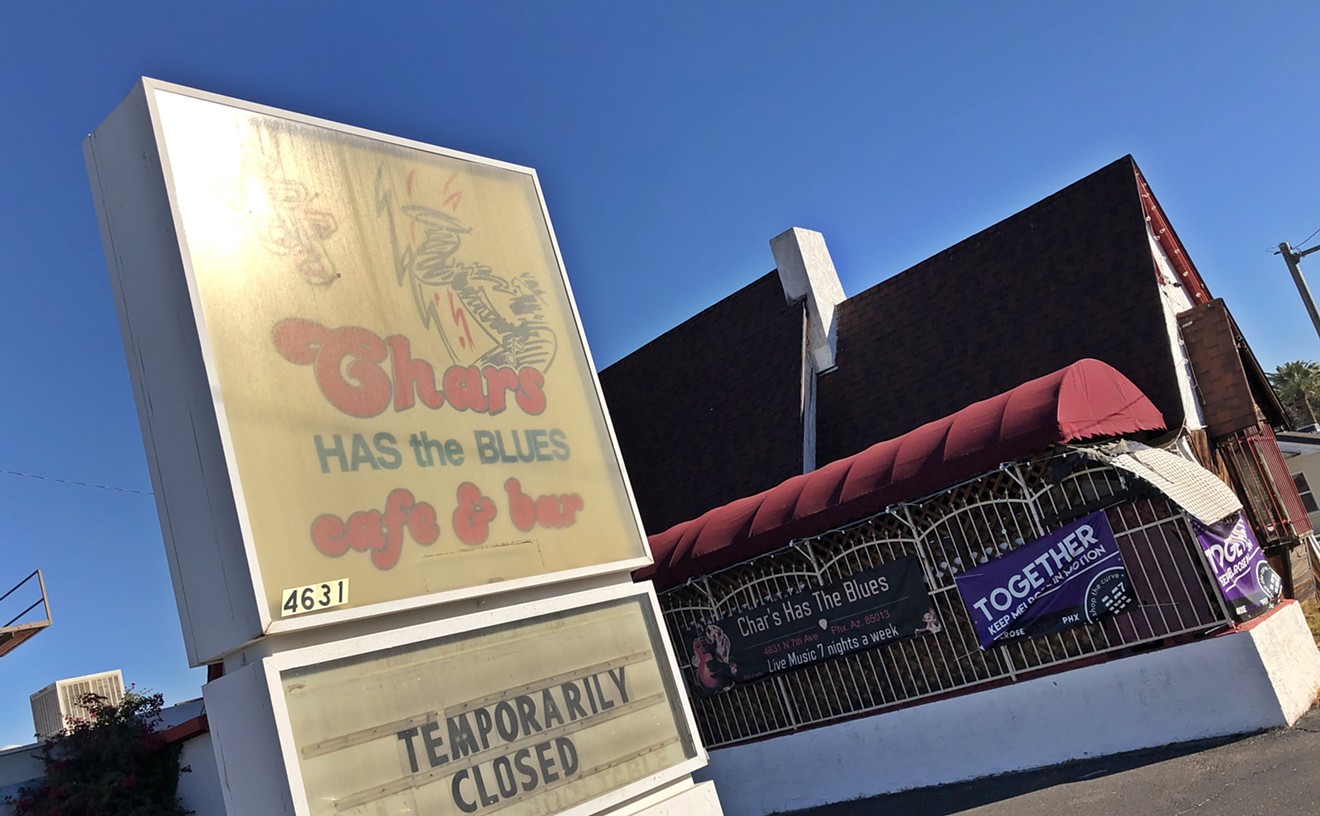My companion, a twentyish college grad newly smitten with indie rock, goes on for a good five minutes lavishing praise on Jimmy Adkins, the band's 25-year-old singer-songwriter.
"Jim Adkins," she coos, finally, "is a genius."
It would've been easy to dismiss her as just another acolyte bowing at the altar of The Next Big Thing. But taken aback by the audacity of the statement -- and being a sneering churl by nature -- I let loose.
"Jim Adkins is not a fucking genius," I spat. "Orson Welles was a genius. Brian Wilson was a genius. Phil Spector was a genius. Jimmy Adkins, my dear, is not a genius."
Now, having listened to Bleed American, it's clear I was wrong.
That's not to say Adkins is a wunderkind in the Welles/Wilson/Spector mold, but, rather, a musical auteur along the lines of John Fogerty or Ric Ocasek: that rare talent who's capable of striking the tricky balance between cultivating mass appeal and maintaining artistic integrity -- while making it appear that little effort was spent doing either.
The birth of Bleed American was a fairly adventurous one. After a difficult two-album turn with Capitol Records, Jimmy Eat World decided to strike out on its own in 2000, parting ways with its label and management, and mortgaging its financial future to fund the recording of the album themselves. The industry buzz on the still-in-the-works record (produced by longtime collaborator Mark Trombino) was so strong that it invited the interest of the powerful G.A.S. agency (the firm that shepherds the careers of the Beastie Boys and Beck) and eventually DreamWorks Records. Sold-out European tours with Weezer, American festival jaunts with Blink 182, late-night TV talk show appearances and glowing reviews in glossy national mags would come in rapid succession.
Here in the Valley, the album, set to hit stores this week, is being greeted with an unprecedented amount of excitement. Already the most anticipated local release in recent memory -- pending sales -- it may well surpass the Gin Blossoms' New Miserable Experience as the most successful.
The group -- Adkins, guitarist Tom Linton, bassist Rick Burch and drummer Zach Lind -- has been pleased with its newfound "It Band" status, if somewhat wary of the potential traps such a position holds. For his part, Adkins has insisted repeatedly to anyone who would listen that Jimmy Eat World "is just a rock 'n' roll band," though the group's zealous online community of fans (found at www.jimmyeatworld.net) and the hordes of pimply-faced teens that turn up at JEW's sold-out shows would probably rate the band closer to an all-consuming passion (if not a way of life) than a humble musical outfit.
Given such lofty expectations, it's easy to see why Adkins is apprehensive. He needn't worry, though, as Bleed American lives up to all the promise.
Kicking things off is the song "Bleed American." It's a deceptive choice for the opener and title track, inasmuch as it's the least representative song of the album. (The use of the cut as the first single is a bit more logical. Given the current state of modern rock radio, the band was obliged to offer its most strident and quintessential "alt-rock" track as an entree to the commercial airwaves.)
Striking an incisive tone, Adkins attempts a vaguely sociopolitical statement about modern-day America. Allusions to "the picket line or the parade" are designed to point out the vast paradoxes and cruel dichotomy of life in the U.S. -- a worldview informed, no doubt, by the band's extensive international touring. And like William Eggelston's cover photo, Adkins is trying to get past the familiar façade -- the America of loving cups and Lucky Strikes -- and down to the harsh reality beneath the pallid surface.
Although "Bleed American" might've been intended as a sort of topical diatribe against the inequities of the not-so-good-old USA, it works more effectively as a personal manifesto. The angular, jutting wall of guitars combines with frenzied drumming to create an atmosphere of disjointed tension. In fact, the song's jittery, wild-eyed quality makes it play like a panic attack set to music.
The lyrics ("I'm not crazy because I take the right pills every day") also hint at a far more personal turmoil at its core. By the time the track reaches its coda and Adkins lets out with a soul-searing howl, listeners will feel as though they've been witness to an exorcism. It's an emotional purge that seems to clear the deck for the more focused material that follows.
The next track, "A Praise Chorus," takes a sharp turn toward the hooky, employing a clever vocal stutter step that hasn't ch-ch-ch-changed since David Bowie did the same nearly a quarter-century ago. More significantly, the song signals a pivotal turn in the band's direction and the moment where the truth of the record begins to reveal itself.
On the band's earlier releases, Static Prevails and, to a lesser extent, Clarity, there were moments when JEW seemed to be looking over its shoulder at a not-so-distant musical past. At times the songs were encumbered by this very sense of personal history, a noble (if impractical) desire to remain true to some idealized hard-core, emo-core or indie ethic. Nearly a decade into its career, though, the band has paid off its old debts, broken any lingering allegiance it might've felt and instead decided to embrace "pop" -- both in terms of form and function -- with a wholehearted abandon.
As has been the case with most of rock's youthful practitioners, JEW's songs, up until now, have been inclined only to look toward the future. But age and experience have given the band's work a newfound sense of nostalgia. By the time "Praise" reaches its climax with Adkins' pleas of "Sing me something that I know," leading into a choral cop of Tommy James' (or more likely Joan Jett's) version of "Crimson and Clover," sung by Davey Von Bohlen of the Promise Ring, it's obvious that the band has discovered a fresh muse.
Critics and naysayers in the post-Nirvana era have tried to dismiss, savage and ultimately bury the notion that rock 'n' roll has the unique ability -- above all other forms of music -- to serve as a panacea for the problems and pains of youth. In recent years, that belief has had to withstand the white-hot glare of hip-hop, electronica, DJ culture, even unsettling hybrids like rap-rock. Yet the thematic undercurrent of Bleed American proves that spirit remains alive and well.
In a way, "A Praise Chorus" shares an unlikely kinship with the work of Mott the Hoople's Ian Hunter. Hunter, who's made a career of penning laddish tales of rock 'n' roll nostalgia ("Saturday Gigs," "All the Way From Memphis," "Roll Away the Stone"), exhibited a fondness early on for the comfort and deliverance found in the familiar strains of an old song -- a tradition that Adkins continues in this track.
Over Von Bohlen's homage to "Crimson," Adkins admits to his own "rock 'n' roll fantasy" and begs for someone to "kick start my rock 'n' roll heart." Clichés, to be sure, but in the hands of these young dudes they're both unexpected and effective -- an affirmation that for all the premature reports of its demise, the old Mott-esque view of rock 'n' roll as saving grace has continued to thrive among Gen X and Yers as well.
Next is "The Middle," an electro-New Wave, hey-little-girl-it's-gonna-work-out anthem, which -- like most of the other old-school nuggets included here -- is haunted by the specter of '70s and '80s California power pop.
And while it's a safe bet that Adkins and Company's CD collections don't include anything by the 20/20, Rubinoos or the Beat, they've still managed to craft a collection of songs that falls squarely in the tradition of Poptopia! and Yellow Pills flag wavers. How the frequently dogmatic citizens of the indie nation will react to an album that owes more to Ian Gomm than Ian Mackaye is a calculated risk.
It's no coincidence, then, that the band quickly sequences "Sweetness" next. The most classic JEW-sounding cut on the record, the tune utilizes the same thrust-and-parry rhythms and propulsive chorus that made "Lucky Denver Mint" a minor hit and fan favorite.
Those more enamored of the band's introspective side will respond favorably to a quartet of mid-to-slower-tempo album cuts. Several of these -- specifically "Hear You Me" and "My Sundown" -- were originally penned for Adkins' orch-pop side project Go Big Casino. Suitably hushed and more restrained than JEW's previous forays into similar territory, they also mark a development in Adkins' ability to create complex emotional dilemmas, narratives that go beyond the wistful melancholy of schoolboy crushes and teen heartbreak.
The first, "Your House," works well enough in this regard, though Adkins' singing comes off as slightly twee. Still, Trombino's subtle production touches -- stealthlike organ, emotion punctuating percussion -- save the song from veering into the realm of puppy-dog pap.
The band is more effective at translating the genuinely sanguine sentiment of "Hear You Me." The song -- part remorse poem and part eulogy for a dead love affair -- is a remarkable bit of craftsmanship. Adkins' burnished vocals navigate the tune, as a bedrock of acoustic guitar dances with a lilting countermelody. Elsewhere, tinkling piano fills and an organ aping the settling of a flügelhorn fades beautifully into the lachrymose din of Rachel Haden's angelic croon.
As a writer, Adkins' motives don't seem all that far removed from Elvis Costello's famous line about "revenge and guilt." JEW covers the latter admirably with "Hear" before tackling the former on the album's standout, "Get It Faster."
Opening with a minute's worth of ominous shudders and thuds, the cut eventually settles into a ticking time-bomb groove, which quickly explodes into a chorus of such Promethean depth and grandeur that it would send even the most dedicated power chord progeny running for cover.
Arguably, it's the highlight of the JEW canon -- as well as the Bleed track whose construction seems to most bear the fingerprints of guitarist Tom Linton. Throughout the band's recent rise, Linton has suffered as the odd man out. His vocal contributions -- in fact, he was once the group's lead singer -- have become marginalized, and understandably so; DreamWorks didn't want to split the audience's focus between dueling front men with this initial effort. But as "Get It Faster" amply proves, Linton remains the band's ace card. His ability to suffuse the material with an army of plangent guitars, swooning lead breaks, supple sonic touches and a general effort serving as point man in Adkins' aural assaults is invaluable.
Midway through, it's evident that lyrically, Bleed is running heavy in the way of doom 'n' gloom dysfunction. There is a creeping sense of paranoia ("I think the whole room can hear me clear my throat") and fatalism ("Even if your heart would listen, I doubt I could explain") at work, verities that again may point to Adkins' mental state when the songs were written. Still, he completes work on an engaging cycle of relationship songs with a guttersnipe sense of self-absorption.
Even when Adkins' material comes up short, as on the unwieldy "Cautioners" (previously released in demo form on last year's split EP with Jedibiah), he still offers up moments of inspiration. Like the most interesting wordsmiths, Adkins isn't afraid to double back on himself regularly, taking a stand or expressing an opinion in one line, only to question or contradict its wisdom in the very next ("Making my peace/Making it with distance/Maybe that's a big mistake"). It's an element that helps JEW's word play avoid the paint-by-numbers lyrical approach that many of its peers seem to wallow in. In contrast to fellow contemporaries -- the Get Up Kids and Modest Mouse, for instance, who've already shown us the bottom of their tiny bag of tricks -- Jimmy Eat World still manages to surprise on a regular basis.
Avoiding any mention of the baser parts of his anatomy, Adkins shows that his heart is really the only organ he's concerned with. Overall, Bleed is a largely sexless and soul-free affair. That the record lacks any hint of R&B swagger is hardly a surprise -- Mesa residents have never been known for bringing da funk -- and clearly the disc was intended from the start as a pure exercise in white pop longing and confusion.
Aiding in that effort is a rhythm section whose confidence has grown exponentially with each new album. As a drummer, Zach Lind is not so remarkable for his percussiveness as his sheer intuitiveness. The trapsman locks into bassist Rick Burch's four-string so perfectly that the album's constant tension-building -- its dynamic starts and stops -- comes off with a startling degree of crispness and precision.
Trombino -- whose innate understanding of the band's strengths and weaknesses is paramount to the success of Bleed -- also deserves credit for harnessing the duo's alternately spare and muscular magic. A drummer himself, Trombino is the rare knob-twiddler who indulges every rhythmic nuance; listen to the spotlight Burch's bubbly heartbeat bass is given on the bridge to "If You Don't, Don't"; or the way the dense wash of cymbals is captured on "Hear You Me."
Similarly, Trombino is just as effective at capturing the multiple personalities of Adkins' voice. His singing -- by turns doleful, spastic and confused -- is dizzyingly diverse, yet it sounds truer here than on any of the band's previous long players.
The one, albeit minor, complaint with the record is Trombino's mix. A number of tracks come off too pristine in their execution. And there are several glaring moments when a bit of suss and sloppiness might've served the songs better. The acoustic guitar tones, in particular, are so clean in spots that they border on the sterile. Still, the crystalline quality of the production helps create the necessary atmosphere for the album's feather-light pop confections, so it's a fair tradeoff.
Reinforcing the overall retro feel is Bleed's penultimate cut, "Authority Song." As the title suggests, it's an homage to the John Mellencamp tune of the same name; the riff that threads the song is also a nick of the Coug's "Hurts So Good." Musically, the band returns to the candyfloss Big '80s pop of its youth -- cascading oohs and aahs, timely handclaps -- with a recidivist's glee.
In contrast, the album closes on a decidedly down note with the elegiac "My Sundown." "Said my goodbyes, this is my sundown/I'm going to be so much more than this," croons Adkins over a pulsating lullaby of minor chord sorrow. While it may seem premature, even cheeky, for a 25-year-old to attempt something like "My Sundown" -- though no more odd than a twentysomething John Lennon warbling "In My Life" -- Adkins delivers his tale with such a weighty sense of resignation it's hard not to believe he's about to drift off into the abyss on a mournful cloud of acoustica.
About a year and a half ago, I found myself at another bar again discussing local music, this time interviewing Jim Adkins in advance of Go Big Casino's debut. As the night wore on and drinks continued to flow, the question was posed about the direction JEW's forthcoming record would take.
"Um, well," stammered Adkins for a good minute, before letting an answer slip out, "I don't think people are going to like our next record."
It was, it turns out, a coded response. Even at that early stage, it was obvious that JEW's new pop-oriented direction might alienate some but ultimately garner a larger audience than the band had ever enjoyed. Clearly, the "people" Adkins was referring to were those among the indier-than-thou set, musicians, scenesters, hipsters and the like, who're sure to dismiss Bleed American for not being sufficiently adventurous, dissonant or corrosive. But it's a ridiculous argument. It is -- as author Nick Hornby once put it -- like criticizing a circle for not having any edges. JEW has emerged from the indie-rock shadows with a redefined sense of self. They've smoothed the sharp angles and corners of their old noise in favor of something warmer, prettier and ultimately more satisfying.
Just as the Ramones were condemned for candy-coating their sound on End of the Century, Elvis Costello derided for Punch the Clock and Green Day suffered for forsaking its supposed ethos with Dookie, JEW will likely be forced to endure similar slings and arrows from some of its onetime faithful.
"I've got no secret purpose," offers Adkins defiantly at the end of "Authority Song" and, indeed, his mission seems clear. Like it or not, Jimmy Eat World has gone "pop" in the truest sense of the word, and to these ears it's sweet, sweet music.
New Times is giving away tickets to the show....sign up for your chance to get some!!!









